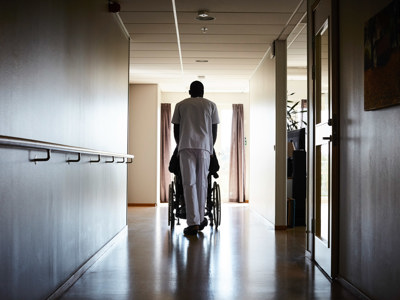
Special school apologises for use of mechanical restraint against severely autistic twin boys
Parents of twin brothers with severe autism have achieved a landmark success with a successful claim under the Human Rights Act for the use of mechanical restraint chairs against their sons.
Posted on 25 March 2022
Kent County Council, which ran Five Acre Wood special school in Maidstone, admitted that the School breached its own Policy, and the Department for Education’s guidance by using mechanical restraint Hardrock chairs against Samuel and Jacob Montague when they were aged between five and eight years old.
Now aged 17, the brothers were removed from the school by their parents Annie and Mark Montague in 2013 after the school continued to mechanically restrain the boys, strapping them into the chairs despite their parents’ objections and protests.
The brothers started at Five Acre Wood school in 2009, aged four, and the intention was that they would attend until age 19.
However, when Annie and Mark went to a school concert in 2010, when the boys were aged five, they were shocked to see them wheeled on to the stage strapped into the wheeled chairs. When they protested to the school they were told the use of the mechanical restraint Hardrock chairs was the only way the boys could participate in such a concert and the incident was a one-off.
However, the parents became concerned that Samuel and Jacob were being routinely restrained while at the school – in June 2011, a clinical psychologist visited and witnessed one of the boys strapped into the Hardrock chairs in the classroom. The parents protested but the chairs continued to be used. On one occasion the boys’ mother and their carer attended a school sports day where other children were outside and running around. Jacob was strapped into the chair and was visibly distressed. The boys’ autism means they interpret the world through touch and movement, so the use of the chairs completely undermined their human rights, said their parents.
After Annie and Mark took Samuel and Jacob out of the school, they home-schooled them and the boys have flourished.
The couple brought a civil case under the Human Rights Act against Kent County Council, saying the restraints had been used unlawfully because the school failed to consider less restrictive options and failed to put in place a plan to reduce the use of restraint.
Kent County Council has now admitted multiple failings through the legal case, and accepted its liability to pay the boys compensation, following a court hearing approving the settlement outcome for the twins.
The school admitted that the use of straps and trays on the specialist chairs could restrict movement and amount to mechanical restraint; that the use of those should be agreed with parents and put in a care plan; that the restraint took place while the boys were at school, without their parents’ agreement, which was a breach of the school’s policy and national guidance; that the school failed to put in place a plan to reduce the use of the restraints or even to consider less restrictive options; that the school failed to record, report and monitor the use of the chairs with straps.
The admissions and the settlement are significant personally for Annie and Mark and the Challenging Behaviour Foundation who have campaigned against the use of mechanical restraint on children with special needs in school. The use of force is permitted against a pupil for behavioural reasons under s.93 of the Education & Inspections Act 2006 however its use on children with special educational needs is controversial and can be considered a breach of their human rights.
Annie and Mark are calling for changes to the law to make it clearer that these restraints should not be used against children like Samuel and Jacob.
Following the settlement, Annie and Mark Montague said:
“We are so pleased that Samuel and Jacob’s cases have come to a successful conclusion, and that the local authority has finally admitted that it failed our sons. Children with special educational needs should be protected, not strapped into chairs. Mistreatment of children like Samuel and Jacob happens behind closed doors, and it is very difficult for parents to find the evidence to challenge it, or to bring a legal case.
“We only sought legal redress after many years trying to get answers from Kent County Council. This case was never about financial compensation; it was about trying to stop these practices happening to other children up and down the country. It has been a long, difficult process, but it has been our privilege to be the voice for Samuel and Jacob. They, and other children with autism or learning disabilities, deserve the full protection of the law. Local authorities should be on their side, empowering their lives, instead of using restrictive practices like restraints that can cause trauma and harm. Now that the case is over, and Samuel and Jacob are safe and thriving, we look forward to campaigning to stop the use of restraints against children with special educational needs.
“We would also like to thank the Legal Aid Agency for funding Samuel and Jacob’s case, and our lawyers Catriona Rubens of Leigh Day and Victoria Butler-Cole QC.”
The head of the Challenging Behaviour Foundation, Vivien Cooper said:
“Fit, active children with learning disabilities and autism should not be strapped into chairs in order to contain them. This form of mechanical restraint is an outdated way of responding to challenging behaviour and has no place in educational settings in the UK in 2022. The impact of restraint on children and their families can be lifelong and significant, but we know that schools can support children successfully without the use of harmful restraint.”
Leigh Day solicitor Catriona Rubens, who represents the Montague family, said:
“Samuel and Jacob were active, sensory seeking children who, because of their autism, interpret the world through movement and touch. It is our view that, by strapping them into mechanical restraint chairs at school, the local authority breached their human rights and failed to deliver any therapeutic benefit to the twins. We welcome Kent County Council’s sincere apology and recognition that it failed Samuel and Jacob in this case.
“Restraints against children with special educational needs should only be used in exceptional circumstances, as the least restrictive option to prevent harm to the child. In my view, it is inappropriate to use restraint at school to control the behaviour of autistic children or children with learning difficulties, who may need to move or run around to self-regulate. The law needs to be clearer to prevent this happening.
“The Department for Education also needs to act quickly to impose a legal duty upon schools to record and monitor every time restraint is used against a child. Without clear records, and good communication between schools and parents, families can be left in the dark about the use of force against their children at school.
“The success of Samuel and Jacob’s case is a testament to the many years their parents spent fighting to get answers from the local authority about the use of restraint against their sons.”
Read the Challenging Behaviour Foundation full statement.

Winterbourne View Abuse Scandal 10 years on
Cat Rubens and Dan Webster discuss what has changed in the 10 years since the Winterbourne View scandal and why so many victims and their families feel that the lessons of their experiences have still not been learned in what they describe as a “broken system”.



